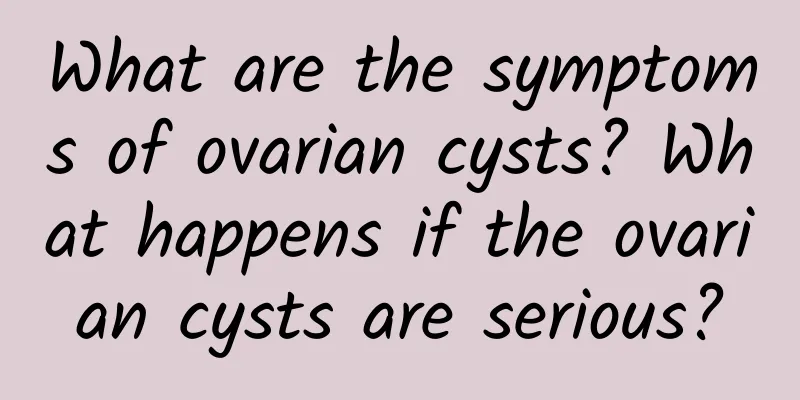What are the symptoms of ovarian cysts? What happens if the ovarian cysts are serious?

|
What are the symptoms of ovarian cysts? What will happen if ovarian cysts become serious? 1. More and more women suffer from ovarian cysts. Ovarian cysts have attracted the attention of many people because of their multiple occurrence and harmfulness. Early treatment can ensure health. However, since the early symptoms of ovarian cysts are not obvious, they are easily ignored by patients. Now it may be a malignant ovarian cyst. Female friends should treat the disease in time when they find it. 2. The clinical symptoms of ovarian cysts mainly include menstrual disorders, thickened waist circumference, and swollen abdomen, which are the most common symptoms. Patients notice that their clothes or belts look tight, just notice the enlarged abdomen, or accidentally feel it in the morning and find that the abdomen is swollen, plus bloating and discomfort. What happens if ovarian cysts become severe? 1. Ovarian tumor Ovarian cysts often induce ovarian tumors. Although the ovary is small in size, it is the best organ for tumor occurrence; the type of tumor is also the first among the organs in the body. Ovarian cysts are common gynecological diseases. It can occur at any age, but it is more common in women of childbearing age. Because the ovaries are located in the pelvic cavity, they cannot be directly observed, and there are no symptoms in the early stage. There is a lack of good early diagnosis and differentiation methods. Once a malignant tumor is discovered, it is often an advanced lesion. So far, the 5-year survival rate of ovarian cancer is still only 25%-30%, which is the most threatening disease among gynecological tumors. 2. Ruptured or ruptured ovary The former refers to the swelling or squeezing of the cyst, and its contents overflowing into the abdominal cavity; the latter refers to the erosion of the cyst wall by the cyst and entering the abdominal cavity, such as serous cystadenoma or cancer papillary protrusions that penetrate the tumor wall. The rupture rate of ovarian tumors is about 3%, and malignant teratomas are most likely to rupture. Spontaneous rupture is more common. Due to rapid growth, the local blood supply of the cyst wall is insufficient, and the incremental cystic fluid ruptures from the weak part of the cyst wall and overflows into the abdominal cavity. Different tumor contents can cause different consequences in the abdominal cavity. In these cases, it can cause comminuted inflammation, intestinal adhesions, and even intestinal obstruction. |
<<: Cervical erosion folk remedies
>>: Can pelvic effusion be cured after 4 days of treatment? How to prevent it?
Recommend
Patients should be careful about the precautions after uterine fibroid surgery
Nowadays, people will take timely treatment after...
The golden 20 minutes of exercise will make your body warmer
Start with five to ten minutes of light aerobic e...
What should I do if I get pregnant again one month after a miscarriage?
What should I do if I get pregnant again one mont...
Can vulvar itching be cured?
Many women do not want to suffer from vulvar prur...
A must-learn for those who sit for long periods of time! Four simple exercises to help lose body fat
Modern people's lifestyles are becoming more ...
Ultrasound diagnosis of acute adnexitis helps everyone solve their problems
Many people panic and don't know what to do a...
How to classify the severity of adenomyosis
How to classify the severity of adenomyosis? 1. F...
Partial body shaping core training strengthens waist and abdomen
Even if many people have the habit of exercising,...
10 ways to fight hunger and lose weight
As the saying goes, knowing yourself and your ene...
What should not be eaten if you have cervical warts?
What should patients with cervical warts pay atte...
How to prevent cervical erosion in women? Women can try 7 methods to prevent cervical erosion.
In daily life, women now pay more and more attent...
King Oyster Mushroom is low in fat, high in fiber and healthy to eat
Mother's Day is the best time of the year to ...
The harm of uterine fibroids can cause many adverse symptoms
How many harmful manifestations does uterine fibr...
What medicine should I take for forced menopause due to uterine fibroids?
Uterine fibroids refer to a benign tumor that gro...
Zheng Xinyi gained 180 pounds again and found out the reason for her obesity
[Key Points]: Recently, Zheng Shaoqiu's daugh...









